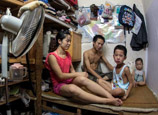
But as the government pushes forward the market mechanism, it will also refrain from implementing structural reforms too fast, which can cause an economic "hard landing."
Last week, Premier Li Keqiang told provincial governors that the policies need to keep growth and employment above a "floor" and inflation below a "ceiling."
"People need to be patient. Reforms can not be realized overnight," said Chang Jian, China economist at Barclays. "The government is preparing for the worst but still sticks to a bottom line."
UPGRADING ECONOMY
Time is on the new government's side. The fear of massive workforce downsizing is diminishing while public understanding of slower GDP growth is rising.
Demand for workers seems to exceed supply as the expanding service sector has been absorbing workforce shed from the manufacturing sector, according to jobs data.
There were 107 job opportunities for every 100 job seekers in the second quarter, down slightly from 110 jobs for 100 seekers in the first quarter, according to the Ministry of Human Resources and Social Security.
Despite the economic slowdown, President Xi Jinping said last month the Party should no longer assess the performance of an official simply based on his record of improving GDP growth.
Premier Li also pledged in a nationwide meeting in May that the government would boost the economy through deepened reforms, including widening market access and reducing government intervention.
The new cabinet has eliminated 133 items that were previously subject to central government administrative approval after Li promised at his first premier press conference that the central government would cut more than 560 such items in five years.
"We do not really care about what the government will do to help. We actually care about what the government will not do," said Shao Xiaofeng, chief risk officer at Alibaba Group, the world's biggest e-commerce company.
"Reforms in fiscal structure, resource pricing and government interventions are expected to be announced in next few months," said Jing Ulrich, managing director of J.P. Morgan Chase China.
"Service sector and high-end manufacturing should be China's new economic drivers. The government needs to support emerging industries like e-commerce. That will reverse current difficulty investors face," Ulrich said.

















 Migrant workes' high incomes not that rosy
Migrant workes' high incomes not that rosy


![]()
